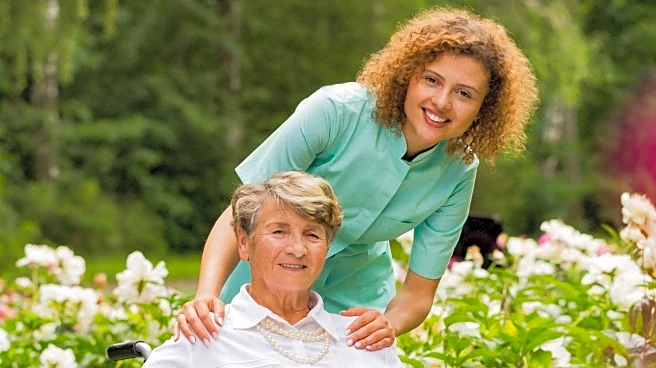What's Happening?
Many women in the U.S. are finding themselves pulled out of the workforce to care for aging relatives, a role that often leads to new career paths. Nicole Nurse, a former fashion executive, left her job to care for her mother diagnosed with Alzheimer's, later transitioning into a media strategist role in health and wellness. This shift is not uncommon, as caregiving imparts valuable skills such as problem-solving, empathy, and crisis management, which can be leveraged in various professions. Despite the challenges, some caregivers find new purpose and career opportunities in health advocacy and related fields. The caregiving burden predominantly falls on women, with 61% of caregivers being female, according to AARP. This demographic often faces emotional and financial strain, yet their lived experiences are increasingly recognized as valuable by employers.
Why It's Important?
The transition from caregiving to new careers highlights the evolving recognition of caregiving skills in the professional world. As more employers acknowledge the value of these skills, it could lead to broader acceptance and support for caregivers re-entering the workforce. This shift is crucial for addressing gender disparities in employment and supporting women who balance caregiving with career aspirations. Additionally, it underscores the need for workplace policies that accommodate caregiving responsibilities, potentially reducing turnover and enhancing employee satisfaction. The societal acknowledgment of caregiving as a skill set may also influence public policy, encouraging more comprehensive support systems for caregivers.
What's Next?
As caregiving continues to impact women's careers, there may be increased advocacy for policies that support caregivers, such as flexible work arrangements and caregiver leave. Employers might further integrate skills-based hiring practices, valuing lived experiences alongside traditional qualifications. This could lead to a more inclusive workforce, where diverse experiences are recognized and rewarded. Additionally, the conversation around caregiving could expand, prompting societal and legislative changes to better support caregivers, particularly women, in balancing their dual roles.
Beyond the Headlines
The recognition of caregiving skills could lead to cultural shifts in how society values unpaid labor, particularly that performed by women. This may challenge traditional gender roles and promote greater equity in both domestic and professional spheres. Furthermore, as caregiving becomes more visible, it could inspire innovations in elder care and support services, addressing the growing needs of an aging population.











